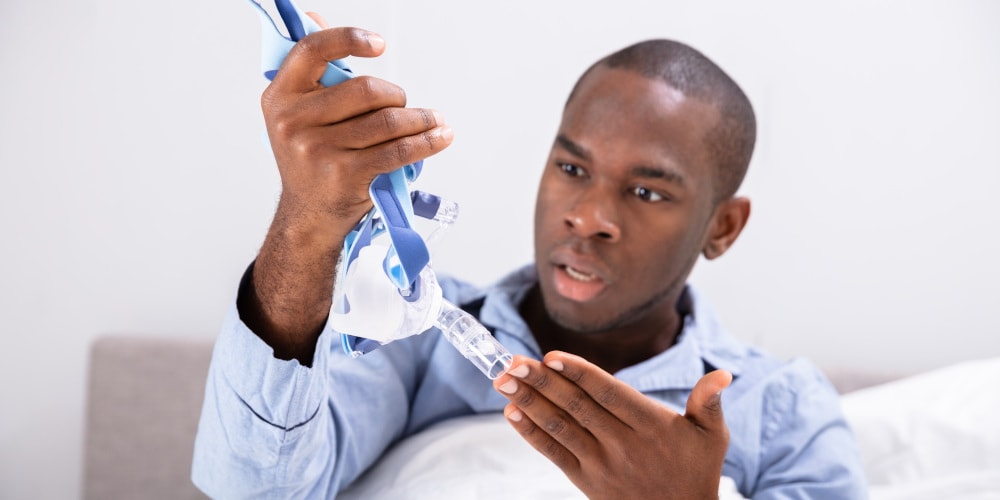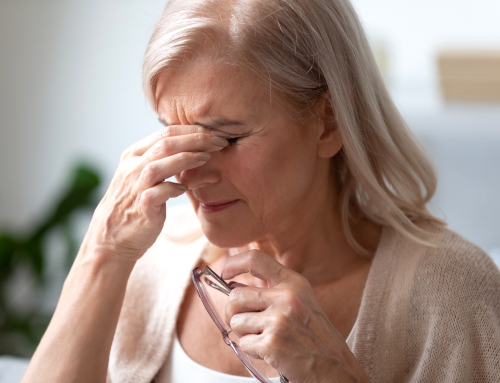If you’ve been diagnosed with obstructive sleep apnea, you know how difficult it can be to get good quality sleep. Obstructive sleep apnea is a sleep disorder that causes people to stop breathing multiple times a night. Obviously, this isn’t good.
So, many people with obstructive sleep apnea get prescribed a continuous positive airway pressure machine—more commonly referred to as a CPAP machine—to wear at night for better sleep.
This device works by delivering a steady, prescribed amount of air pressure into the nose and mouth through a mask. The positive pressure opens up the airway, relieving the obstruction that causes sleep apnea. A CPAP machine is a reliable way to treat sleep apnea. However, many people find it difficult to wear the mask throughout the night, and other CPAP users experience dry eyes related to the machine.

What are dry eye symptoms?
Dry eyes can be bothersome and even painful at times. Frequently, CPAP mask leaks will cause a flare in dry eye syndrome or dry eye disease (DED).
What are the symptoms of dry eye disorder? The most common symptoms that patients experience include:
- Watery eyes
- Red eyes
- Eye itching
- Burning sensation in the eye
- The sense of dust or grit in the eye
- Blurry vision
- Light sensitivity
- Feeling as if eyes are heavy or tired
Some people also develop extra discharge in and around the eyes.
Does CPAP cause dry eyes?
According to Ophthalmology Times, the prevalence of dry eye disease is considered to be about 6.8% among adults in the United States. But many patients are not diagnosed with DED clinically because they assume their eye irritation may be related to allergies or exposure to some type of irritant. Thus, the patient attempts to treat dry eyes at home with little to no improvement.
Women with sleep apnea tend to have a higher incidence of DED – almost double that of men. DED is also markedly higher among patients 75 years of age and older.
The biggest question here is whether CPAP use causes dry eyes, and if so, is there a way to treat it? Studies have found that the incidence of dry eye disease is higher in patients who use a CPAP machine.
Patients who have no history of dry eye disease may go on to develop it once they start using a CPAP machine to treat sleep apnea. The incidence of the disease is higher among those who have diabetes and chronic obstructive pulmonary disease.
While this does not mean that a CPAP device directly causes dry eye disease, it appears to be a risk factor for developing the condition.
What are some other dry eye causes?

Other conditions can cause dry eyes. These include:
- Age: Over 75% of persons over age 65 have dry eye disease
- Airborn environmental factors: such as dust, smoke, wind, or irritants
- Wearing contact lenses or improperly cleaned contact lenses
- Allergies: These can develop at any age. The most common are pollen, dust, and animal dander.
- Medications: Certain medications, such as antihistamines, antihypertensives, and hormonal medications, can cause dry eyes
- Autoimmune conditions: such as Sjogren’s syndrome, rheumatoid arthritis, or lupus
- Other health conditions: such as diabetes, psoriasis, rosacea, irritable bowel syndrome (IBS), or vitamin A deficiency
- Blepharitis: Inflammation of the base of the eyelashes and lid
- Meibomitis: When oil glands along the eyelid rim become clogged, blocking tear supply
- Floppy eyelid syndrome: When eyelids don’t close completely during sleep, so the ocular surface is exposed to air and dries out. Eyes are particularly irritable when the patient awakens
You may also develop dry eyes from a combination of these factors plus cold weather or excessive screen time.
How to prevent dry eyes from CPAP?
If you are sure your CPAP machine is contributing to your dry eyes, you are probably wondering how to prevent dry eyes from CPAP use. Here are a few things you can do to ensure you are treating your sleep apnea properly and minimizing the risk of developing or worsening dry eye disease:
Ensure a proper fit
The biggest culprit of dry eyes related to CPAP use is an improperly fitting mask. If it is too big, too small, or the incorrect shape, there may be air leaks around the seal. This air usually blows directly into your eyes, causing dryness.
To fix this issue, have a technician work with you. Make sure you are wearing a prescribed fit.
You may also benefit from replacing a full face mask with nasal pillows. A nasal pillow has less risk of air leaks.
Check the pressure settings
Have you messed with the air pressure settings? Did the technician accidentally set the pressure too high? Have your kids or grandkids been playing with your machine? A high pressure setting can result in air leakage.
To fix this, check your settings and relay them to your technician or healthcare provider. If your settings aren’t correct, get help adjusting to the correct settings.
Clean your machine regularly
If you’ve been neglecting to clean your machine as recommended, there may be a buildup of skin oils and dust. Contaminants interfere with the mask’s seal causing air leaks.
To fix this, clean every part of your machine and mask as recommended by the manufacturer. If you moisturize your skin at night, opt for something with less oil.
Add a humidifier
Make sure to fill your humidifier! The built-in humidifier will keep the airflow from drying out your mouth or nose. Too little moisture, and you’re dealing with dry air. Too much moisture buildup around the mask can break the seal, causing air leakage. To address this, start at the lowest setting and adjust until comfortable.
Check that all parts are functioning
If all else fails, make sure you aren’t due for a part replacement. Replace the soft cushion that comes into contact with your skin every 2-4 weeks and the hard masks every 2-3 months.
How to help dry eye symptoms?
Dry eyes cause unpleasant side effects on their own, but can also compromise your overall eye health. Artificial tears or eye drops can help relieve symptoms in the short term, but if your dry eyes persist, you’ll need an eye doctor to find the underlying cause.
Assil Gaur Eye Institute are masters of dry eye care
The professional care team of ophthalmologists and optometrists at AGEI offers first-class eye care and vision correction, specializing in LASIK vision correction and treating glaucoma, cataracts, and a wide variety of cornea and retinal conditions. And, of course, dry eye disease.
AGEI is a state-of-the-art health care facility bringing together revolutionary technologies and experienced eye care professionals. Our goal is to help you achieve better vision.
Please call 866-945-2745 or visit us here to make an appointment online. If you are experiencing any concerning symptoms or require immediate eye care, contact us immediately to determine the best time to schedule an exam.
At Assil Gaur Eye Institute we take our patients’ safety seriously. Our facility’s Covid-19 patient safety procedures exceed all of the CDC’s coronavirus pandemic recommendations. Masks are required in our institutes at all times.
We are conveniently located for patients throughout Southern California and the Los Angeles area at locations in or near Beverly Hills, Santa Monica, West Los Angeles, West Hollywood, Culver City, Hollywood, Venice, Marina del Rey, Malibu, Manhattan Beach, and Downtown Los Angeles.
- What’s New in Keratoconus Treatment? A 2024 Update - 04/16/2024
- Dr. Assil and His Team Correct the Side Effects of Laser Eye Surgery - 04/03/2024
- What is ocular herpes? - 09/22/2023













